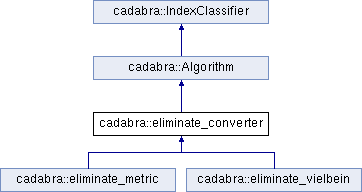|
| | eliminate_converter (const Kernel &, Ex &, Ex &, bool) |
| |
| virtual bool | can_apply (iterator) override |
| |
| virtual result_t | apply (iterator &) override |
| |
| | Algorithm (const Kernel &, Ex &) |
| | Initialise the algorithm with a reference to the expression tree, but do not yet do anything with this tree.
|
| |
| virtual | ~Algorithm () |
| |
| void | set_progress_monitor (ProgressMonitor *) |
| | Provide the algorithm with a ProgressMonitor object on which to register (nested) progress information, to be reported out-of-band to a client.
|
| |
| result_t | apply_generic (bool deep=true, bool repeat=false, unsigned int depth=0) |
| | The main entry points for running algorithms, which traverse the tree post-order ('child before parent').
|
| |
| result_t | apply_generic (iterator &, bool deep, bool repeat, unsigned int depth) |
| |
| result_t | apply_pre_order (bool repeat=false) |
| | Apply algorithm with alternative traversal: starting from the top node, traverse the tree pre-order ('parent before child') and once the algorithm acts at a given node, do not traverse the subtree below anymore.
|
| |
| bool | check_consistency (iterator) const |
| | Given an expression top node, check index consistency.
|
| |
| bool | check_index_consistency (iterator) const |
| |
| bool | check_degree_consistency (iterator) const |
| | Given an expression top node, check differential form degree consistency.
|
| |
| void | report_progress (const std::string &, int todo, int done, int count=2) |
| |
| index_iterator | begin_index (iterator it) const |
| |
| index_iterator | end_index (iterator it) const |
| |
| unsigned int | number_of_indices (iterator it) |
| |
| std::string | get_index_set_name (iterator it) const |
| |
| bool | rename_replacement_dummies (iterator, bool still_inside_algo=false) |
| | Rename the dummies in the sub-tree starting with head at the given iterator.
|
| |
| Ex_set_t | dependencies (iterator it, bool include_derivatives_of=true) const |
| | Determine all the Coordinate dependencies of the object at 'it'.
|
| |
| bool | derivative_acts_on (iterator it) const |
| | Is this a symbol on which a derivative acts?
|
| |
| | ExManip (const Kernel &, Ex &) |
| |
| bool | prod_wrap_single_term (iterator &) |
| | Take a single non-product node in a sum and wrap it in a product node, so it can be handled on the same footing as a proper product.
|
| |
| bool | prod_unwrap_single_term (iterator &) |
| |
| bool | sum_wrap_single_term (iterator &) |
| |
| bool | sum_unwrap_single_term (iterator &) |
| |
| bool | is_single_term (iterator) |
| | Is the indicated node a single term in an expression?
|
| |
| bool | is_nonprod_factor_in_prod (iterator) |
| |
| void | force_node_wrap (iterator &, std::string) |
| | Wrap a term in a product or sum in a node with indicated name, irrespective of its parent (it usually makes more sense to call the safer prod_wrap_single_term or sum_wrap_single_term above).
|
| |
|
| virtual bool | is_conversion_object (iterator) const =0 |
| |
| bool | contains (sibling_iterator from, sibling_iterator to, sibling_iterator arg) |
| |
| void | find_argument_lists (range_vector_t &, bool only_comma_lists=true) const |
| |
| template<class Iter > |
| range_vector_t::iterator | find_arg_superset (range_vector_t &, Iter st, Iter nd) |
| |
| range_vector_t::iterator | find_arg_superset (range_vector_t &, sibling_iterator it) |
| |
| unsigned int | locate_single_object (Ex::iterator obj_to_find, Ex::iterator st, Ex::iterator nd, std::vector< unsigned int > &store) |
| |
| bool | locate_object_set (const Ex &objs, Ex::iterator st, Ex::iterator nd, std::vector< unsigned int > &store) |
| |
| bool | separated_by_derivative (iterator, iterator, iterator check_dependence) const |
| | Figure out whether two objects (commonly indices) are separated by a derivative operator, as in.
|
| |
| void | pushup_multiplier (iterator) |
| |
| template<class BinaryPredicate > |
| unsigned int | intersection_number (sibling_iterator, sibling_iterator, sibling_iterator, sibling_iterator, BinaryPredicate) const |
| | Determine the number of elements in the first range which also occur in the second range.
|
| |
| void | node_zero (iterator) |
| |
| void | node_one (iterator) |
| |
| void | node_integer (iterator, int) |
| |



 Public Member Functions inherited from cadabra::Algorithm
Public Member Functions inherited from cadabra::Algorithm Public Member Functions inherited from cadabra::ExManip
Public Member Functions inherited from cadabra::ExManip